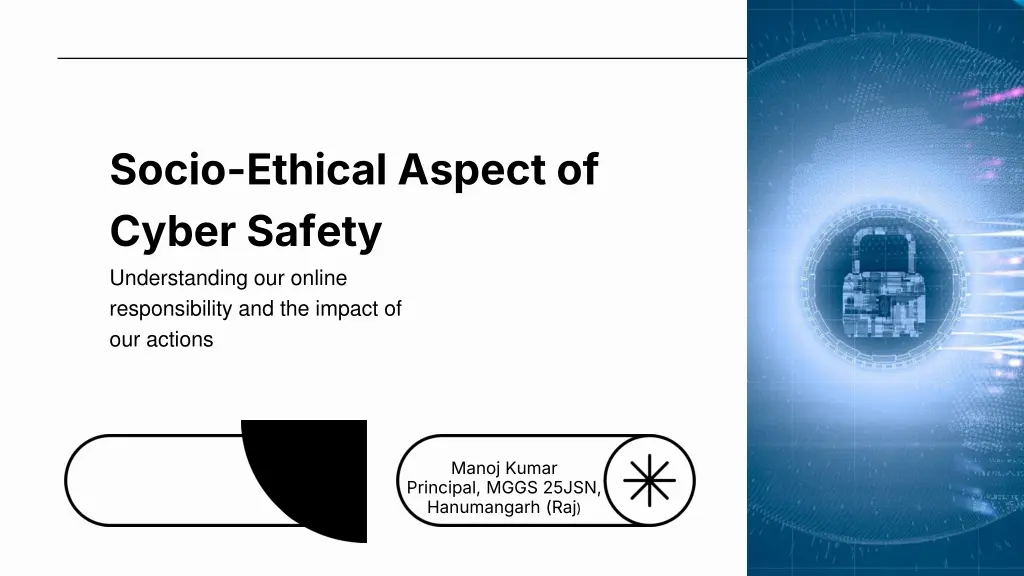
Understanding the Socio-Ethical Aspect of Cyber Safety
Explore the socio-ethical aspect of cyber safety, focusing on online responsibility, ethical behavior, and the impact of actions. Topics include cyber ethics, privacy, handling cyberbullying, and promoting a safe online environment.
Download Presentation

Please find below an Image/Link to download the presentation.
The content on the website is provided AS IS for your information and personal use only. It may not be sold, licensed, or shared on other websites without obtaining consent from the author. If you encounter any issues during the download, it is possible that the publisher has removed the file from their server.
You are allowed to download the files provided on this website for personal or commercial use, subject to the condition that they are used lawfully. All files are the property of their respective owners.
The content on the website is provided AS IS for your information and personal use only. It may not be sold, licensed, or shared on other websites without obtaining consent from the author.
E N D
Presentation Transcript
Socio-Ethical Aspect of Cyber Safety Understanding our online responsibility and the impact of our actions Manoj Kumar Principal, MGGS 25JSN, Hanumangarh (Raj)
October 2023 Cyber safety goes beyond technical tools it includes social behavior online. What Are We Talking About The focus is on teaching youth not only to stay safe but also to act ethically, responsibly, and respectfully online.
Understanding Ethics ETHICS IS ABOUT LIVING A GOOD LIFE A CONCEPT DATING BACK TO SOCRATES. Understanding Cyber Ethics CYBER ETHICS APPLIES MORAL VALUES LIKE HONESTY, RESPECT, AND RESPONSIBILITY TO ONLINE BEHAVIOR. It s a human effort to decide how to live well, making ethics central to our digital conduct too. Examples include respecting privacy, avoiding plagiarism, avoiding cyberbullying, and not spreading fake news.
01Privacy means control over personal information. Students must learn to manage what they share, understand platform settings, and respect others' privacy because it's ethically right. 02 respectful and kind. Ethics demand respectful language, resolving conflicts positively, and promoting an inclusive digital space. 03 Students need to evaluate online content critically. They should learn to detect fake news, verify sources, and understand bias because spreading false info is ethically Online communication must be Core principles of Cyber Ethics
Creating a Safe Online Environment Cyberbullying through messages, photos, fake profiles raises serious ethical concerns. It affects both victim and bully and highlights the need for a culture of empathy and respect online.
Strategies for Responding to Cyberbullying WHEN IT OCCURS: Strategies for Preventing Cyberbullying ETHICAL PREVENTION INCLUDES: Take reports seriously Support victims fairly Involve parents, school officials, and law enforcement Document incidents ethically and thoroughly Educating about its impact Promoting respect and empathy Setting rules for online behavior Creating an inclusive classroom environment
The Role of Social Media SOCIAL MEDIA HELPS CONNECTION AND CREATIVITY BUT POSES ETHICAL CHALLENGES: Fostering Digital Citizenship DIGITAL CITIZENSHIP MEANS USING TECH SAFELY AND ETHICALLY. Privacy concerns Cyberbullying Misinformation Mental health impacts Students must be guided to use it ethically and responsibly. It involves online safety, digital literacy, respectful communication, and ethical decision-making. Teaching this is essential for student success.
Empowering Ethical Digital Citizens ETHICAL USE OF THE INTERNET IS A SHARED RESPONSIBILITY. Partnering with Parents & Community PARENTS AND COMMUNITIES ARE KEY ALLIES. Schools should provide resources, workshops, and open communication to help families address ethical online behavior. Teachers must empower students to make positive, ethical choices online, helping build a better digital world.
